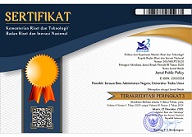Effectiveness of Implementing the Automatic Exchange of Information Policy in Efforts to Increase Tax Revenue
Abstract
The Automatic Information Exchange policy implemented in Indonesia since 2018 has found obstacles in the utilization and processing of AEoI data. This research aims to analyze the effectiveness and factors that influence the effectiveness of AEoI policy implementation. This research uses a post-positivism approach and descriptive research type. Data collection was carried out using in-depth interviews and literature studies. The informants in this research were the Directorate General of Taxes and Tax Academics—the effectiveness of AEoI policy implementation using Richard Steers' theory. The results of the study found that the performance of the AEoI policy was quite adequate based on system perspective indicators and the emphasis on human behavior, which can be seen from the increase in the number of participants every year, the implementation of the AEoI policy according to applicable international standards, the cooperation and coordination carried out by the DJP so far has been established even though Problems found in indicators of optimization/achievement of objectives include human resource constraints, potential tax disputes, quality of data exchange, time constraints, and financial population constraints. Factors that influence the effectiveness of AEoI policy implementation include organizational characteristics, environmental characteristics, and management policies and practices. This shows that these factors influence the effectiveness of AEoI policy implementation on tax revenue efforts. However, some workers need to improve the effectiveness of implementing AEoI.
Keywords
Full Text:
PDFReferences
Akmam, S. (2018). Pertukaran Otomatis dalam Informasi: Perspektif Ekonomi Politik. Jurnal Hubungan Internasional, 10(2), 133. https://doi.org/10.20473/jhi.v10i2.7301
Arief, T., & Pratama, W. P. (2022). Potensi penerimaan signifikan. https://www.idx.co.id/StaticData/NewsAndAnnouncement/ANNOUNCEMENTSTOCK/From_EREP/202207/0022084470_1827eb070e.pdf
Aura., A. (2021). Analisis Pemanfaatan Data Automatic Exchange of Information Oleh Kantor Pelayanan Pajak Dalam Rangka Peningkatan Penerimaan Pajak di Indonesia. Universitas Indonesia.
Bensch, O., Popa, M., & Spille, C. (2021). Key information extraction from documents: Evaluation and Generator.
Dahlan, M. (2020). SHADOW ECONOMY, AEOI, DAN KEPATUHAN PAJAK. Jurnal Kajian Ilmiah Perpajakan Indonesia, 2(1).
Fahrurrozi, R., Murwadji, T., & Rukmini, M. (2020). Problematika Pengungkapan Rahasia Bank Antara Kepentingan Negara Dan Perlindungan Kepada Nasabah. Jurnal Esensi Hukum, 2(1), 77-96.
Febyani, Y. M., & Widodo, J. (2020). Peran Aeoi Dalam Keterbukaan Informasi Pajak Untuk Meningkatkan Penerimaan Pajak Di Indonesia. Dialogue : Jurnal Ilmu Administrasi Publik, 2(2), 147–159. https://doi.org/10.14710/dialogue.v2i2.9921
Hasim, M. P., Priyono, F. J., & Sa’adah, N. (2018). Karakter Multilateral Competent Authority Agreement On Automatic Exchange Of Financial Account Information Dan Implikasinya Pasca Program Tax Amnesty Di Indonesia. Diponegoro Law Journal, 7(4), 345-363.
HJI Panayi, C. (2016). Current trends on automatic exchange of information. Singapore Management University School of Accountancy Research Paper, (2016-S), 43.
Indriani, I. (2021). Evaluasi Penerapan Automatic Exchange of Information (Studi Banding Indonesia Dan Jepang). Accounting Global Journal, 5(2), 173–184. https://doi.org/10.24176/agj.v5i2.6421
Ispriyarso, B. (2020). Automatic Exchange of Information (Aeoi) Dan Penghindaran Pajak. Masalah-Masalah Hukum, 49(2), 172–179. https://doi.org/10.14710/mmh.49.2.2020.172-179
Juwono, M. V., & Gunadi, H. (2021). EVALUASI PENERAPAN AUTOMATIC EXCHANGE OF INFORMATION (STUDI BANDING INDONESIA DAN JEPANG). Accounting Global Journal, 173-184.
Kusuma, I. L., & Dewi, M. W. (2018). Kebijakan Tax Amnesty: Suatu Peninjauan dalam Perspektif Etika Deontologi Sebagai Bentuk Pilihan Wajib Pajak dalam Melaksanakan Kewajiban Perpajakan. Jurnal Akuntansi Dan Pajak, 18(2), 204. https://doi.org/10.29040/jap.v18i2.118
Majalah pajak. (2021). Ikut Melawan Pengelakan Pajak. Majalah Pajak. https://majalahpajak.net/ikut-melawan-pengelakan-pajak/
Pohan, C. A., Rahmi, N., Arimbhi, P., & Junaidi, A. (2022). Automatic exchange of information review from the perspective of its effectives in minimizing tax evasion. Ilomata International Journal of Tax and Accounting, 117-138.
Pohan, C. A., Rahmi, N., & Lestari, P. A. (2022). Efektivitas Pertukaran Informasi Otomatis Dalam Menangkal Penghindaran Pajak. Jurnal Reformasi Administrasi, 9(1), 12–22.
Rante, K. R. (2019). Reaksi pemerintah Indonesia pasca munculnya panama papers tahun 2016. EJournal Hubungan Internasional, 7(3), 1361-1378.
Reese, P. D. (1987). . United States Tax Treaty Policy Toward Developing Countries: The China Example. UCLA L. Rev., 35,.
Rr. Herini Siti Aisyah. (2021). Diskresi Presiden dalam Pengaturan Keterbukaan Informasi Perpajakan Government Discretion in Regulation of Tax Information Disclosure. Halu Oleo Law Review, 5(1), 74–84. http://repository.unisda.ac.id/id/eprint/586
Sari, D. P. (2019). Analisis Perbedaan Penerimaan Pajak Sebelum dan Sesudah Penerapan Program Pengampunan Pajak (Tax Amnesty) Pada KPP Pratama Denpasar. Jurnal Sains, Akuntansi Dan Manajemen, 1(1), 1–34.
Sari, E. V. S. E. V. (2016). Fiskus Terbatas, Ditjen Pajak Desak Buka Data Perbankan. CNN Indonesia. https://www.cnnindonesia.com/ekonomi/20160225160428-78-113535/fiskus-terbatas-ditjen-pajak-desak-buka-data-perbankan
Selvi, S. (2018). Automatic Exchange of Information Sebagai Big Data Di Bidang Perpajakan. Transparansi Jurnal Ilmiah Ilmu Administrasi, 1(1), 128–133. https://doi.org/10.31334/trans.v1i1.144
Strauss, A., & Corbin, J. (2003). Penelitian Kualitatif. Yogyakarta: Pustaka Pelajar.
Supriyadi. (2019). Automatic Exchange of Information sebagai Sarana Meningkatkan Empat Pilar Kepatuhan Pajak. Jurnal Reformasi Administrasi, 6(6), 118.
Urinov, V. (2015). Developing country perspectives on automatic exchange of tax information. Law, Social Justice & Global Development Journal,.
Wangke, H. ( Di. (2021). Diplomasi digital dan kebijakan luar negeri Indonesia. Yayasan Pustaka Obor Indonesia.
Yasa, I. N. P., & Mandala, I. P. W. (2016). Tax amnesty dan Implementasinya. SAR (Soedirman Accounting Review) : Journal of Accounting and Business, 1(2), 40. https://doi.org/10.20884/1.sar.2016.1.2.302
Yustiari, S. H. (2016). Tax Amnesty dalam Perspektif Good Governance. Jurnal Ilmiah Administrasi Publik, 2(4), 169–174. https://doi.org/10.21776/ub.jiap.2016.002.04.6
DOI: https://doi.org/10.35308/jpp.v9i3.7491
Refbacks
- There are currently no refbacks.
Copyright (c) 2023 Nadya Farina Wahyudi, Maria RUD Tambunan
p-ISSN: 2477-5738 I e-ISSN: 2502-0528 I DOI: 10.35308
Jl. Alue Peunyareng, Ujong Tanoh Darat, Meureubo, Kabupaten Aceh Barat, Aceh 23681, Indonesia
(0655) 7110535 l +621260313742 l +6285277110911
 is licensed under a Creative Commons Attribution-ShareAlike 4.0 International License
is licensed under a Creative Commons Attribution-ShareAlike 4.0 International License


